Macedonian diasporas
The existence of a diaspora implies a separation, or even a break, with a unit of belonging. Before dispersion, individuals were grouped into variable units: ethnic group, ethnic community, people, nation. Likewise, diaspora implies separation from a place considered to be "the homeland/country of origin". As a result, it represents a separation from the group to which one belongs and the place of origin; the severing of group and spatial ties, leading to integration, rather than assimilation, in a foreign place, turning its members into foreigners.
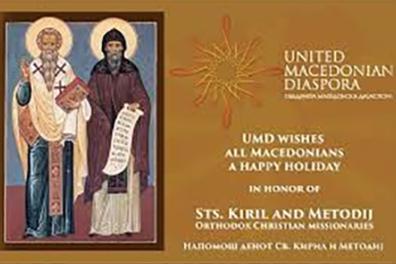
In some situations, people remain in the same place, on the territory of origin, but politics reconfigures space, creating new relationships to places and people by establishing or changing borders and states. Without changing place, people belonging to the same group are dispersed by competing and conflicting identifications/claims, and by forced attachment to other, diverse ethnic entities. They become strangers to the group to which they belong, to the place to which they belong and to themselves, in a process of disaffiliation.
Separated from the parent entity, the homeland, or separated from each other from the group to which they belong when the state does not, or not yet, exist, individuals become "members of a minority", whether recognized or not. Depending on the location and nature of the unit to which they belong, diaspora is the metamorphosis of a nation, people or ethnic community into a visible or invisible minority, depending on whether it is recognized or not.
A diaspora may exist through the close ties that unite its dispersed members, but be invisible to others. It may have no effective organization as such, but exist because of the presence of a population on a territory and, in particular, its symbolic/referential attachment to the event that produced it.
If diaspora exists through its dispersal and reseeding, there are unfertile seeds that are lost forever and other black seeds[1] that experience their dispersal as permanent mourning, or persistent ones that, like quackgrass[2], grow back in any place and at any time, despite the will to eradicate them.
Why title this text: Macedonian diasporas? Because the Macedonian diaspora falls into these various aforementioned categories.
Macedonia, the only de-ethnicized Balkan territory, renamed "conventional" or "geographical" when the other territories "regain", after more than five centuries, their "historical and ethnic continuity".
Mathieu Grenet and Angelos Ntalachanis, in their study: "La diaspora grecque 1820-1960: une minorité aux marges de l'État?[3]", they pose a fundamental ontological problem that concerns all the peoples making up the Ottoman Empire: "How, in fact, can we write the history of this country born 'ex nihilo' in 1821 from the decline of the Ottoman Empire, and whose demography and geography have never really coincided since then? In other words, how can we achieve a synthesis between the Greece of the "Greek lands" and that of the diaspora? A story made all the more common by the fact that Orthodox Christians (including Macedonians) subject to the Sultan were grouped together in the first legally protected religious community: the millet Rum, created in 1453. The creation of the schismatic millet Bulgar in 1870 marked the beginning of a redefinition of the community, which was no longer exclusively religious, but also linguistic-religious. The millet Bulgar became the community of some Slavic-speaking Orthodox, including Macedonians. The Macedonians attempted to have their church recognized, but failed mainly because of the Patriarchate of Constantinople, also known as the Greek Patriarchate, which was keen to maintain its supremacy over Orthodoxy and reconstitute the Byzantine Empire. So there was no Greek millet, no Serbian millet, no Albanian millet, and so on. And yet, after some five Ottoman centuries, from this multi-faith, multi-ethnic grouping, new states were born on a single national basis, establishing a "continuity" with an ancient, even antique, past.
The last European possession of the Ottoman Empire, which historiography calls Macedonia, also known as the apple of discord or the powder keg of the Balkans[4], was the object of expansionist aims by the newly-formed states following the liberation struggles of the Balkan peoples during the 19th and early 20th centuries.
The cartography relating to the Balkan Peninsula in general and Macedonia in particular is considerable in number. "In the 80 years between 1842 and 1920, some one hundred maps were produced, first by far, then more closely, concerning Macedonia in the geographical sense of the term"[5]. Ethnographic, ethnological, ethnolinguistic, ethnocratic maps coloring this territory with the ideological hues of the various actors, with the aim of depriving it of any reference to Macedonian ethnicity. And yet, from the quarrels of the belligerents emerges a people that is difficult to erase, because it is difficult to assimilate in its difference, under the ethnonym "Slavic"[6], or "Macedoslav".
The history of the Macedonians' liberation struggles is as long-standing and eventful as that of other Slavic peoples. Moreover, Macedonians contributed to the various liberation struggles of other Slavic peoples. One event, however, stands out from those of other peoples: Greek, Serbian and Bulgarian. The Saint Elie uprising of August 2, 1903 (Ilinden), which led to the creation of the First Democratic Republic of the Balkans: The Republic of Krushevo, when the other Balkan peoples created kingdoms, was violently repressed, putting an end to the Republic and causing a great wave of migrations across the seas and oceans. Numerous Macedonian diasporas, notably in Australia, Canada, the United States and Argentina, were mainly the result of this event. The organizations created by these diasporas very often bear the name of this event, considered to be the founder of the first modern Macedonian state.
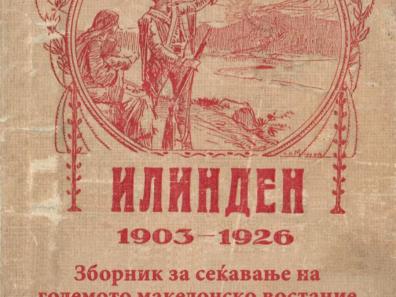
This was followed by the Balkan Wars and the Treaty of Bucharest of August 10, 1913, sanctioning the division of Macedonia, transformed into a "conventional" or "geographical" territory, into four parts attached to four states: Greece, Serbia, Bulgaria and Albania, dispersing the Macedonian population over the four territories. Historians would name these parts Aegean Macedonia, Pirin Macedonia, Vardar Macedonia and Lake Macedonia[7].
With Macedonia gone, the population thus divided also disappeared and, for a small part, became a minority. In Greece and Bulgaria, it was never recognized as a minority. Greece considered that there were no Macedonians other than the ancient Greeks, while Bulgaria declared that Macedonians were only Bulgarians from Macedonia. In Serbia, they are known as "southern Serbs". Albania was the only state to recognize the Macedonian minority. The division of Macedonia, which led to the dispersal of Macedonians who remained within their own borders, gave rise to several diasporas. Some, invisibilized by the process of forced assimilation and victims of ongoing ethnocide, in Greece and Bulgaria. The other, relatively visible as a minority occupying a territory in Albania perceived as so "negligible" that it is not taken into account by historians, thus rendering invisible the only space where the diaspora is visible.
The ethnocidal practices of the new states, in the process of building the nation-state, use all the weapons at their disposal to achieve their ends, starting with terror, the source of massive departures with no possible return[8]. Hundreds of villages were burnt down in New Greece to erase all trace of the Macedonian presence and make return impossible. For those who remained, the names of people, places and religious buildings were repeatedly changed and Hellenized[9]. An initial legislative framework was established mainly between 1926 and 1929, with the most violent practices taking place during the Metaxas dictatorship (1936-1940), the civil war (1946-49) and the colonels' dictatorship (1967-1974), to erase all references and traces of macedonity. It was also in Greece that the principle of population exchange was invented, precisely for the Macedonian population exchanged as "Bulgarian" in 1919 (Treaty of Neuilly) and, in the case of torbeshes / pomaks (Islamized Macedonians), as "Muslim" in 1923 (Treaty of Lausanne). Another way of dispersing the population by erasing it through assimilation with other populations, in other states. The Micrasiates, one and a half million Orthodox Christians from Asia Minor, were driven from their homes and settled in the territory of Macedonia in Greece. Another way of breaking down the ethnic homogeneity of a population in a recently acquired territory[10].
.
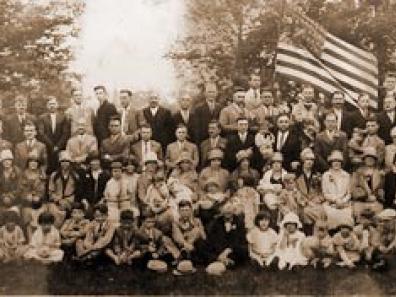
Forced migrations, following wars, in this case the Greek civil war of 1946-1949, are another form of dispersion, making these refugees, having had to abandon their domus, "doma, in Macedonian", stateless, both out of home and out of self. Where they arrive, depending on their country of departure, they are listed as "Bulgarian" or "Greek", and later still as "Yugoslav", and attached to these diasporas. They then had to fight again to make themselves visible as Macedonians, victims in their "host countries" of the Greek and Bulgarian diasporas' negationist propaganda.
During the Ottoman period, the phenomenon of the pechalba[11] developed. Described as "temporary economic emigration", this social fact was to become a custom (the new male initiation) that it was forbidden not to observe. From the 15th century to the present day, in two phases: internally (Ottoman Empire, then Yugoslavia) and externally in European countries and overseas, it has affected the Macedonian male population and is now extending to the female population, emptying the country of its workforce and currently of its qualified and skilled youth[12]. In the hope of reaching the European "Eldorado", some resort to Bulgarian naturalization, hoping to obtain a passport[13] enabling them to benefit from the status of European Union nationals. Bulgarian policy encourages these naturalizations, which justify the ideology of the non-existence of a Macedonian people and the denial of Macedonian history. After the Greek-Macedonian conflict over the name, settled by the Treaty of Prespa, erga omnes, imposing a change of constitutional name from Republic of Macedonia to Republic of North Macedonia (officially in force since February 12, 2019), another conflict threatens Macedonia's entry into the EU, if Bulgarian demands to impose a "common history" are not met. With Bulgaria's entry into the EU, Bulgarian MPs demanded recognition of a Bulgarian minority in Albania[14]. This proposal was adopted. However, the places concerned by these demands are precisely those inhabited by the Macedonian diaspora, recognized by Albania. The Macedonian diaspora in Albania, through its association and its newspaper "Ilinden", is campaigning against this forced Bulgarianization and is trying to raise awareness of the Bulgarian state's desire to transform the Macedonian minority into a Bulgarian minority, and thus ethnocide it.
.
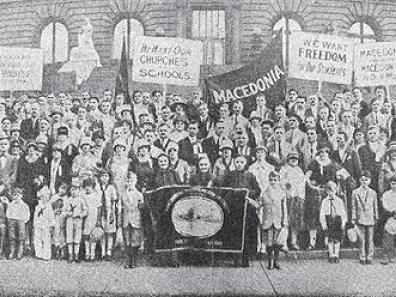
Bulgaria, on August 1, 2017, prior to the signing of the Treaty of Prespa between the Hellenic Republic and the Republic of Macedonia (June 12, 2018), signs the Treaty of Friendship and Good Neighborliness with the Republic of Macedonia. The bilateral agreement, for Bulgaria, is to form part of the negotiating framework for EU accession of the Republic of Northern Macedonia. In August 2019, Bulgaria sent an "Explanatory Memorandum on the relationship of the Republic of Bulgaria with the Republic of North Macedonia in the context of the EU enlargement and Association and Stabilization Process" to EU member states only, so the Republic of North Macedonia is not an addressee, for discussions within the EU as part of the negotiating framework. In this Memorandum, it states that: 1) "Macedonia is a geographical and historical area that today lies within the borders of six countries - Bulgaria, Greece, the Republic of North Macedonia, Albania, Kosovo and Serbia." 2) Explains why there is no Macedonian minority (diaspora) in Bulgaria: "In neighboring countries, the term 'Macedonian' is used to designate geographical origin, not national identity. In Bulgaria, hundreds of thousands of Bulgarians identify themselves as "Macedonians" in terms of regional affiliation, which clearly indicates Bulgarian ethnic origin. For this reason, a major misunderstanding arises when the terms "Macedonian" and "from the Republic of North Macedonia" are used interchangeably in international forums." 3) Macedonians are said to be an artificial creation, part of a "project" initiated between the two world wars "to eradicate the Bulgarian identity of this population" by imposing a new "southern Serb". This attempt "having failed", Tito is said to have "imposed" a "new" "Macedonian" identity in the Socialist Republic of Macedonia, "inspired by the decision of the Communist International (Kominter) in 1934 to create new peoples". 4) This new Macedonian identity would require the invention of a "new history". The implementation of this political project, according to Bulgaria, would not have been possible without the collaboration of "the 'linguists' of the Communist-controlled Antifascist Assembly for the National Liberation of Macedonia (ASNOM)", who declared the existence of a distinct "Macedonian" language on August 2, 1944. 5) At several points in the text, it is reiterated that there is no such thing as a "Macedonian ethnic minority". These claims are therefore unfounded[15], as are those calling for the recognition of a people and a language: "The basis on which the codification was carried out and the manner in which it was imposed testify that the official language used in today's Republic of North Macedonia can only be considered as a written regional standard of the Bulgarian language." And, while the Treaty of Prespa, supported by Bulgaria, is erga omnes, in other words valid for all therefore everywhere, it cannot apply to a third country when it comes to the name of the language: "Macedonian language", used in this Treaty. Bulgaria requires that "EU documents (both before and after EU accession) refer to the 'official language of the Republic of North Macedonia' or, in case of absolute necessity, to the 'Macedonian language' with an asterisk and an explanation as follows: "in accordance with the Constitution of the Republic of North Macedonia". Recalling its commitment to applying the highest international standards in the field of defending human rights, more specifically self-identification, Bulgaria nevertheless conditions this right on "objective criteria linked to a person's identity" which could be exercised "depending on the cumulative fulfillment of both the subjective (presence of free will to belong to a certain ethnic group or community, religious, linguistic, minority) and objective criteria (existence of real differences that objectively prove the existence of an ethnic group, a religion, a language significantly different from those of the majority). " For this reason, Bulgaria does not include the Macedonian minority in its census. Some Macedonians, however, declare themselves voluntarily (cf. 2011 census, which includes 3,100 Macedonians). In Bulgaria, the organization OMO "ILINDEN" and the Party[16] for Economic Development and Integration of the Population (OMO "ILINDEN" - PIRIN), founded in November 1989 after the fall of communism in Bulgaria, are considered separatists and are said to be financed by foreigners. Hence the statement in the Memorandum: "Bulgaria does not grant collective rights, only individual ones. Therefore, foreign-induced demands by minorities are unacceptable." The Memorandum is a de facto veto, given that unanimity is required for negotiations[17].
Associations have been set up wherever Macedonians live, often grouped around a church. In France, this is the case of the association Communauté Culturelle Orthodoxe Saints Cyrille et Méthode (CCOSCM/ http://ccoscm.free.fr/index.html), founded in 2000, one of whose aims is to practice Orthodox worship in Macedonian and to introduce the French and the European community to Macedonian cultural heritage. The community's church is La Chapelle orthodoxe macédonienne Notre-Dame des Apôtres in Pantin[18].
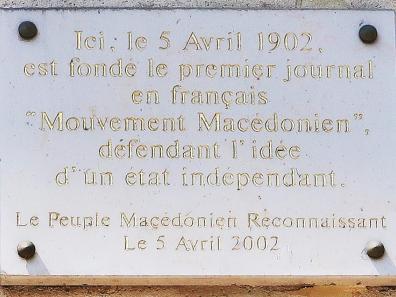
The diaspora has a World Macedonian Congress (WMC), a World Macedonian Youth Congress, a website Macedonian info diaspora, an international organization: United Macedonian Diaspora (United Macedonian Diaspora (UMD), etc.
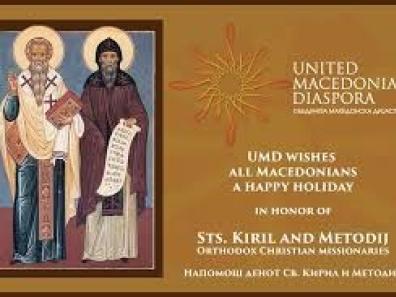
To conclude: what about the Republic of North Macedonia's relations with the diaspora? In his article "Faraway, So Close!", Aleksej Demjanski[19], on 29.09.2020, is surprised that we haven't noticed the abolition of the ministry without portfolio in charge of the diaspora, since the formation of the "new-old" coalition government of the Social Democrats (ex-Communist Party) led by Zoran Zaev. The 2017-2020 program stated that the government, through the Ministry of Foreign Affairs, would look after the welfare of the Macedonian national minority living in neighboring countries. Similarly, the government had announced the need to create a national strategy for cooperation with the diaspora by forming a working body that would include the office of the minister without portfolio responsible for the diaspora, government institutions, experts and representatives of the diaspora. A strategy that never saw the light of day. The diaspora has distanced itself in view of the various difficulties encountered, such as corruption and politicized, unqualified personnel. It was also during this period that the Treaty of Prespa was put in place, sanctioning the change of constitutional name; the Treaty of Friendship and Good Neighborliness, calling for a revision of Macedonian history and affirming the non-existence of the Macedonian people, its history and its language; and the Law on the Use of Languages, establishing Macedonian-Albanian bilingualism. For the diaspora, this national cooperation strategy has become a "betrayal". With the new parliamentary elections renewing the coalition led by the Social Democrats, the new 2020-2024 program still timidly raises the question of the national strategy for cooperation with the diaspora. But who is going to implement it in the absence of a ministry in charge of the diaspora?
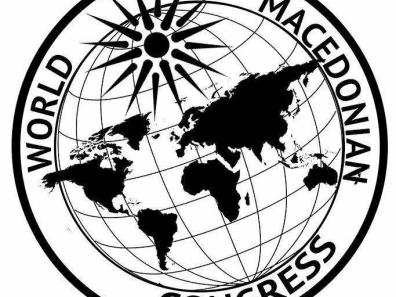
Frosa Pejoska-Bouchereau
University Professor, HDR in Macedonian language, literature and civilization
Notes
[1] Tachko Gheorghievski, a child refugee from the Greek Civil War 1946-1949, would dedicate his literary work to the event. The civil war in Greece was also a civil war of the Macedonians, who demanded recognition as a national minority and improved social rights. This event was not called a "civil war" but a "revolution" by those who witnessed it. One of his works is entitled La graine noire. Tachko Gheorghievski, La graine noire, translated from Macedonian by Maria Bezanovska, L'Esprit des Péninsules, Paris, 1997; Le cheval rouge, translated from Macedonian by Maria Bezanovska, L'Âge d'homme, 1989. See also Tchatchanski Krste, L'ombre de la chauve-souris, L'Harmattan, Paris, 2003 (novel, translation from Macedonian by Isabelle Maoska); Le rêve de dieu, l'Harmattan, 2004 (Translated from Macedonian by Conkinska Cvetanka).
[2] Petar Andreeveski, another Macedonian author, entitled his first novel Пиреј (Pirej - Chiendent). The story takes place before and after the First World War.
[3] Grenet, Mathieu; Ntalachanis, Angelos, "La diaspora grecque 1820-1960; une minorité aux marges de l'Etat?", in L'histoire des minorités est-elle une histoire marginale?, Laithier Stéphanie, Vilmain Vincent (éds), Paris, Presses de l'Université de Paris Sorbonne, 2008.
[4] Dejan Dukovski, Baril de poudre, translated from Macedonian by Frosa Pejoska, Editions L'Espace d'un instant, 2020.
[5] Joëlle Dalegre, ""À la recherche des Macédoniens" : le regard des cartes, 1840-1918", Cahiers balkaniques, Inalco, 38-39/2011.
[6] The "Slavic" ethnonym used to designate Macedonians signifies an indistinct "whole", a subtle negationism! Indeed, other Slavs are named by a particular ethnonym: Bulgarian, Russian, Polish, Czech, Serbian, Croatian, Slovak, Slovenian, etc. Macedonians in the Republic of Macedonia are referred to as "Slavs" of Macedonia, to distinguish them from "Serbs", "Bosnians", "Albanians", "Turks" of Macedonia, etc.
[6b] Ilinden, Recueil en mémoire du grand soulèvement macédonien published by Vardar from 1920 to 1934. The Macedonian Student Association "Vardar" is a student organization of Sofia University, refugees from Macedonia, founded in 1920. It develops cultural, political and editorial activities, publishing numerous books and brochures. The organization maintained contacts with the National Union of Bulgarian Students, the Macedonian Youth Union, the Union of Macedonian Students Abroad and the ORIM (Internal Macedonian Revolutionary Organization)
[7] Greece received 51.38% of Macedonia (Aegean Macedonia), i.e. 34,356 km², with a population estimated in 1919 at 1,042,000 inhabitants; Serbia 38.4% of Macedonia (Vardar Macedonia), or 25,713 km², with a population of 728,000; and Bulgaria 10.1% of Macedonia (Pirin Macedonia), or 6,798 km², with a population of 236,000. The newly-created state of Albania received 0.12% of Macedonia's territory, around Lake Prespa and Lake Ohrid. Bulgaria reoccupied Vardar Macedonia during the First World War, and Vardar and Aegean Macedonia during the Second World War.
It was not until the end of the Second World War, with the creation of a Republic of Yugoslavia, that the part of "Vardar Macedonia" became a constituent republic of the federation, on an equal footing with Bosnia-Herzegovina, Croatia, Montenegro, Serbia and Slovenia. The Macedonian language was one of the three official languages of the Socialist Federal Republic of Yugoslavia.
[8] See the Enquête dans les Balkans. Rapport présenté aux Directeurs de la dotation par les Membres de la Commission d'enquête, Centre européen de la Dotation Carnegie, Éditions Georges Crès et Cie, 1914.
[9] Athéna Skoulariki, "La Querelle des noms: l'identité disputée des Slavophones en Macédoine grecque", https://www.academia.edu/7253203/La_querelle_des_noms_L_identité_disputée_des_slavophones_en_Macédoine_grecque
[10] Tassos Kostopoulos, (2011) "How the North was won. Ethnic cleansing, population exchange and the politics of colonization in Greek Macedonia", European Journal of Turkish Studies, Thematic Issue No. 12, Demographic Engineering II, http://ejts.revues.org/index4437.html.
Leonidas Embiricos, "Kilkis 1913: territory, population and violence in Macedonia", European Journal of Turkish Studies [Online], 12 | 2011, online May 21, 2012, URL: http://journals.openedition.org/ejts/4486
Georges Nakratzas (1998), in an article published in Politis magazine, discusses "The genocidal crimes of the Bulgarian army at Doxato and the Greek army at Kilkis in 1913.
Nakratzas, Giorgos (1998) "Τα εγκλήματα γενοκτονίας : του βουλγαρικού στρατού στο Δοξάτο και του ελληνικού στρατού στο Κιλκίς το 1913 (σύμφωνα με στοιχεία της CarnegieReport)", Πολίτης δεκαπενθήμερος 58, pp. 29-31.
Nikos Sigalas and Alexandre Toumarkine, "Demographic engineering, genocide, ethnic cleansing. Dominant paradigms for the study of violence on minority populations in Turkey and the Balkans", European Journal of Turkish Studies [Online], 7 | 2008, online September 23, 2008, http://journals.openedition.org/ejts/2933
Christina Alexopoulos-de Girard, (2017) Représentations mémorielles de la guerre civile grecque dans le discours des vainqueurs et des vaincus, published by Classiques Garnier, in the "Littérature, Histoire, Politique" collection edited by Catherine Coquio.
[11] Frosa Pejoska, L'émigration: du fait social à la coutume, Peter Lang, 2018.
[12] There are no precise statistics on the number of pechalbari around the world. The age of the phenomenon and its transformation into a custom is a measure of its scale. From the mid-19th century to the 1970s, V. Andonov gives the figure of 600,000 Macedonians who emigrated from Macedonia, see Emil Heršak and Milan Mesić, "L'espace migratoire de Ygoslavie : historique des migrations Ygoslaves", in Revue Européenne des Migrations Internationales, Volume 6 - N°2, 1990.
[13] Various statistics are put forward on the number of naturalized Macedonians from Bulgaria: from 61,000 to 300,000. Those who obtain a passport must not only express their desire to become Bulgarian, but also express the "feeling of being Bulgarian" and certify that their ancestors had the same feeling. These Macedonians do not know the Bulgarian language and do not live in Bulgaria. Once they have obtained their passports, they disperse to the countries of Western Europe. They do not declare themselves Bulgarian, even though their new civil identity is Bulgarian. In general, they retain dual nationality.
[14] "24.Insists that more efforts are needed to protect the rights of all minorities in Albania through the full implementation of the relevant legislation; calls for the rights of people of Bulgarian ethnicity residing in the regions of Prespa, Golo Brdo and Gora to be guaranteed in texts and in practice," Knut Fleckenstein, "Report on the Commission's 2016 report on Albania." 2.02.2017, A8-0023/2017. Proposal adopted, see European Parliament resolution of 15 February 2017 on the 2018 Commission report on Albania (2016/2312(INI)) - P8_TA-PROV(2017)036.
See the website of the leading Macedonian Organization Ilinden - Tirana, https://ilinden-tirana.com/makedonczi-vo-albanija/ , https://vesnik-ilinden.com/ . See on the "Bulgarization of Albania" https://www.slobodenpecat.mk/po-makedonija-ke-se-bugarizira-i-albanija/
[15] The political party OMO "ILINDEN" - PIRIN, having succeeded in obtaining the required number of votes, took part in the 1999 municipal elections in the Blagoevgrad district. On February 29, 2000, by decision of the Bulgarian Constitutional Court, the Party was banned from participating in the Bulgarian political system, deemed unconstitutional on grounds of "separatism". The European Court of Human Rights in Strasbourg has repeatedly condemned the Bulgarian state for violating article 11 of the European Convention on Human Rights. See International Convention on the Elimination of All Forms of Racial Discrimination (CERD) CERD/C/BGR/19, March 11, 2008. Bulgaria, refusing to recognize the Macedonian minority, considers its expression by associations and parties as unfounded and continues to refuse to register them.
[16] The Party also defines itself as the Democratic Movement for Human and Minority Rights in Bulgaria. It has been part of the European Free Alliance (EFA) since 2007.
[17] 35 Bulgarian historians, scientists and intellectuals in the humanities and social sciences have written an open letter opposing the Explanatory Memorandum. They call for an evolution in Bulgarian historical thinking on the subject of North Macedonia: "We do not believe that Europe can understand the theories of certain Bulgarian academics, who speak neither the language of contemporary historiography, nor the language of contemporary human and social sciences [...]. We don't believe that the only problem is that which refers to the ideological identity of Communist Yugoslavia - the problem also comes from the domination of a certain perception of history in Bulgaria, which is backward, romantic and mythological". It also states: "We do not believe that the process of formation of the Macedonian nationality, taking into account all its specificities, differs in essence from the way in which all other nations are constituted [...]. We oppose the simplistic presentation of the constitution of the Macedonian nation solely as the result of Yugoslav propaganda", see the website of the French Embassy in Bulgaria, https://bg.ambafrance.org/lundi-5-octobre-9026#s-Des-historiens-scienti…, and Mediapool.bg where the letter in its full version is published: https://www.mediapool.bg/evropa-ne-ni-razbira-balgarski-ucheni-poiskaha-novo-istorichesko-mislene-za-severna-makedoniya-news312809.html#comments
[18] https://www.patrimoine-religieux.fr/eglises_edifices/93-Seine-Saint-Denis/93055-Pantin/173718-ChapelleorthodoxemacedonienneNotre-DamedesApôtres